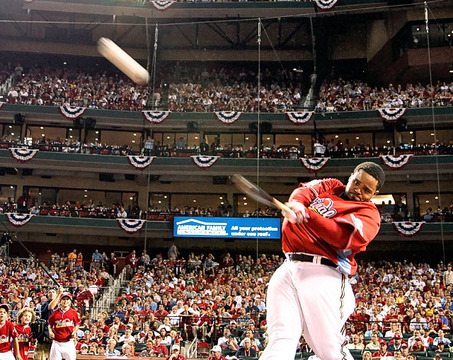The long haul versus the long ball
 I’m not a huge baseball fan. It may be because I was never a big baseball player, and by big I mean I was never any good at it. I couldn’t see the ball coming out of the pitcher’s hand and so I could never hit it. In fact, here are two interesting facts about my short-lived Little League career:
I’m not a huge baseball fan. It may be because I was never a big baseball player, and by big I mean I was never any good at it. I couldn’t see the ball coming out of the pitcher’s hand and so I could never hit it. In fact, here are two interesting facts about my short-lived Little League career:
1. My batting average for the season was .000 but my sister’s was .600. She made the All-Stars. I didn’t.
2. I got on base one time the entire season, not because I was walked, but because I was so desperate to get on base that I leaned into a pitch so it would hit me.
Obviously, I was terrible, and that doesn’t help me when it comes to trying to like the sport. That, and the season is about 140 games too long and the games move at a snail’s pace. Like I said, I’m not a huge baseball fan.
But I do enjoy the Home Run Derby. I’m intrigued by the competition of it, the flashes of the cameras with every swing of the bat, and the power of the long ball. Something about the crack of the bat and the quick rise of the ball into orbit captivates me, and I find myself dreaming of doing the same thing. It’s a long way from throwing yourself in front of a Little League pitcher’s 50 mph fastball, that’s for sure. Trust me, no one was taking pictures of that at bat!
But when it comes to ministry – especially mine right now as the lead pastor of a church plant – I’m re-evaluating where exactly the long ball fits into the whole ministry scheme. It’s easy to feel like we should build on the long ball as a foundation. After all, it’s exciting and makes our church stand out among the other couple of hundred churches in our area. It creates a buzz, too, and I think that’s the whole principle behind what’s become known as the “launch large” model for church plants. I mean, who doesn’t like buzz, right? Like I wrote earlier, no one was taking pictures of me at bat during my one season of baseball (except my mom, and I think she did it from behind a tree with a large telephoto lens so no one would know I was her kid), and not only that, but very few pictures get snapped of singles or walks.
But putting aside the excitement of it all, let’s ask the simple question: is building on the long ball sustainable, or even practical? Without trying to sound like a total stat nerd (after all, there can only be one Matthew Berry, right?), take a look at the stats so far in this season for the winner of this year’s Home Run Derby (hang with me, I’m going somewhere!). To date, Prince Fielder has gone to the plate 326 times and he’s hit 15 home runs. That’s a home run 4.6% of the time, or once about every 20 at bats. In ministry terms, that means that every 5 months you and I would preach a sermon or hold a service that could be described as “hitting it out of the park.” But most of us are swinging for the fences every Sunday, and while the motivation is applaudable, the method is beginning to feel very suspect to me. I just don’t know if swinging for the fences each week is ultimately what will set us up for long term success in the churches and ministries we lead.
Consider this (to continue with the baseball stats): Fielder has 15 long balls this year, but he has FOUR TIMES AS MANY RBI (that’s runs batted in for you baseball newbies) as he does home runs. Why is that? It’s because the long ball is individual-driven but the long haul (singles, walks, getting on base in order to be brought around to score) is team-driven. If everyone was swinging for the fences and getting out, there wouldn’t be anyone on base for Fielder to bring home.
Practically speaking, it just makes more sense to be consistent in the daily things. The things that aren’t as flashy but last longer and set us up for long term success. Stuff like prayer, growing in the Scriptures, and nurturing relationships with others who are in for the long haul with us. It doesn’t mean we’ll never hit a home run (because you probably will) or that we shouldn’t snap a picture when those incredible moments happen (they set up stones as altars when long balls were hit in the Bible so they wouldn’t forget ’em). It just means that to expect them every week creates unnecessary pressure for everyone involved to outdo whatever happened the week before, and even worse than that, it opens us up to becoming dissatisfied with the “everyday” moments with Jesus, and the long haul is full of those.
Love the long ball, yes. But live the long haul and you’ll enjoy the home run moments for what they really are: moments in time that motivate us to be faithful in the majority of times that may not.






Leave a Comment